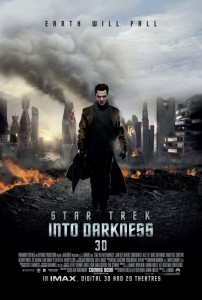Any comparison of trailers to final cuts with blockbusters will show that PR firms and studios have gotten more savvy about using different takes and versions of scenes to cut dramatic trailers with their own sense of atmosphere and narrative. JJ Abrams however, took all that a bit further with Star Trek Into Darkness, actually modifying a scene shown to the press to obfuscate the truth about his film’s narrative.
Spoilers for Star Trek Into Darkness to follow…
—————-
From the moment a sequel to Star Trek became inevitable, the speculation was on: “Will they do Khan?” By virtue of the second Star Trek film being the best, Khan has become popularly fixed as James T. Kirk’s Joker figure, with no real regard for  the actual context of that film and that character. We’re always on the lookout for a nemesis, after all. Still, as soon as casting began and Star Trek 2 was in proper production, the debate was on about who would be antagonizing starfleet this time.
the actual context of that film and that character. We’re always on the lookout for a nemesis, after all. Still, as soon as casting began and Star Trek 2 was in proper production, the debate was on about who would be antagonizing starfleet this time.
Then came the rumors, flat denials, more denials, the misdirecting quotes, additional denials from actors all to obfuscate the fact that, “yes, the fucking villain is fucking Khan guys, it’s not even a big deal.”
Well even with all that, JJ Abrams went even farther. A visit to Bad Robot for a pack of journalists resulted in a number of set visit stories and articles about the production, with many made confident that John Harrison was the real villain. Abrams pulled this off by inviting them to view a sequence from the film- a sequence for which he’d deliberately filmed alternate dialogue, and had his VFX people create alternate ship-display readouts. Here’s the description of what those bloggers saw, care of Germain Lussier at /Film:
The scene in question was the space jump, which takes in the middle of act two and features Cumberbatch’s character and Captain Kirk shooting through space towards the another starship. It’s an exciting action sequence that included two distinctly unforgettable moments. The first was a readout on the Enterprise bridge clearly stating “Harrison” as the character’s name. The second was Spock clearly saying the name “Harrison.” Twice. Not so coincidentally, this was the same day Paramount released this photo revealing the character’s name: John Harrison. The rest of the day, the question of who Cumberbatch was playing never in doubt. He wasn’t Khan, just John.
When you look back on it, it seems almost like he was trying too hard!
 Even still, it’s completely understandable that so many smart guys walked away convinced that either A) the villain was not Khan, period, or B) if the villain was Khan, Abrams would be introducing him in a truly unique way.
Even still, it’s completely understandable that so many smart guys walked away convinced that either A) the villain was not Khan, period, or B) if the villain was Khan, Abrams would be introducing him in a truly unique way.
Then came the cold truth: the villain is 100% named Khan, bears his basic biographical details, and this is revealed in the film in the most blatant, unsophisticated manner possible. No clever twists, just Benedict Cumberbatch growling into the camera that his name is “Khan” to make the audience gasp with absolute non-shock.
There are fundamental problems with this of course: Khan was Khan because there was an episode of the series that gave the film context, granted an air of history and ominousness to the villain when he returned to terrorize Kirk. Khan is also Khan because of such a distinctive, flamboyant performance from Ricardo Montalban, his relationship with his crew. You remove these two elements and suddenly Khan is not Khan, he is a british guy with a name. Even the similar details –he’s the leader of a banished group, superhuman, bent on galactic purification– are so sidelined and irrelevant that they barely register. Instead he’s now a post-Nolan TERRORIST villain who darts around the universe at will with no clear scheme and no notable relationship to our protagonist and his thinly-sold emotional arc.
Now obviously I have major problems with Star Trek Into Darkness, and many of those problems are with the very fundament of Abrams and his writers’ approach to this sequel and its villain. I’m not going to harp further on the foolishness of pretty much everything they were trying to do (though I could go for another few thousand words, easy). But laying aside the problems with the film, let’s think for a second what this means for how the film was sold. Consider the painful lengths this production went into covering up a detail that people were guessing about before the film was even written. Compare the difference between the lame, fumbling magic trick of convincing people that you’re not going to do a thing you’re obviously going to do, only to do it the most obvious way possible versus, say, the trick Marvel pulled with Iron Man 3.
Personally, I feel like we’ve started the summer with a fine example of how much more successful and interesting a story can be when it’s being genuinely subversive and unexpected rather than simply finding new, gritty ways to reframe old toys. Even the box office returns seem to bear this out…
I’m interested to hear chewer perspectives on this: is it cool that Abrams went to such lengths as this to hide Khan? Or does it represent something troubling and misguided? At the end of the day these are all just different attempts to bring us joy and entertainment, but when we’re talking about the guy with the keys to the biggest kingdom there is, it’s an important distinction to make, no?
